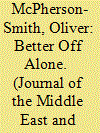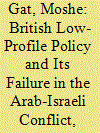| Srl | Item |
| 1 |
ID:
178881


|
|
|
|
|
| Summary/Abstract |
Somalia is a country of two realities: the internationally recognized Federal Republic of Somalia and the self-declared Republic of Somaliland. While the Federal Republic endures chronic instability and unrest, Somaliland has established security, economic growth, and a functioning government. This article argues that a significant contributing factor to this divergence is the radically different colonial regimes that ruled the two regions before their unification and independence in 1960. British rule in British Somaliland sought primarily to deny other empires control of the Protectorate and to trade livestock with the indigenous communities. Italy, however, engaged in a protracted and violent effort to establish a plantation colony in Italian Somaliland. Drawing from colonial-era sources and with a focus on the earliest years of imperial and Somali engagement, this article situates the long-run divergent trajectories of British Somaliland and Italian Somaliland within the broader literature on colonial institutions and long-run economic development.
|
|
|
|
|
|
|
|
|
|
|
|
|
|
|
|
| 2 |
ID:
178879


|
|
|
|
|
| Summary/Abstract |
Following the Suez Campaign in October 1956, Great Britain began to step away from the Middle East. Its policy aimed at a gradual withdrawal from the region while protecting its interests, ensuring the uninterrupted supply of oil, and curbing Soviet expansion. Hence the policy of the United Kingdom (UK) was to maintain stability as another war between Israel and its Arab neighbors would be detrimental to its economy and provide the Soviet Union with the opportunity to deepen its incursion into the region. Britain therefore adopted a low-profile policy, designed to avoid taking sides in the Arab-Israeli conflict. In practice, it was burying its head in the sand. The Arabs viewed the absence of clear support for them, particularly in the issue of water, as implicit support for Israel, especially since Britain was secretly supplying the latter with weapons. London’s low-profile policy did not stand the test of regional developments. The tension between Israel and Egypt that emerged in mid-May 1967, intensified over the closing of the Straits of Tiran by Egypt, led the UK to take steps to ensure free passage through them.
|
|
|
|
|
|
|
|
|
|
|
|
|
|
|
|
| 3 |
ID:
178878


|
|
|
|
|
| Summary/Abstract |
This article provides a taxonomy of the ways in which jihād and jihād propaganda have been used in medieval Islamic history and in modern times within the framework of Sunnī-Shīʿī relations. It identifies five main relevant patterns of usage: I) Sunnī jihād against a Shīʿī foreign power; II) Shīʿī jihād against a Sunnī foreign power; III) Shīʿī use of jihād propaganda against a foreign power – usually a Christian power – as a means to gain legitimacy among Sunnīs; IV) Sunnī-Shīʿī cooperation and solidarity through jihād against a foreign power; and V) Sunnī jihād against an internal, Shīʿī enemy. It then discusses the implications of the continuity of these patterns over many centuries for the understanding of Sunnī-Shīʿī relations generally and critiques some aspects of recent scholarship on “sectarianization.”
|
|
|
|
|
|
|
|
|
|
|
|
|
|
|
|
| 4 |
ID:
178882


|
|
|
|
|
| Summary/Abstract |
Based mainly on archival and oral sources this study examines the history of the cattle-herding Samburu people from the mid-nineteenth century through Kenyan independence in 1963. The authors emphasize the resilience and resourcefulness that the transhumant pastoralists exhibited as they encountered a host of challenges that ranged from epidemics and major outbreaks of disease among their livestock to interethnic competition for scarce resources to a host of disruptions brought on by colonial rule. The allegedly scientific nostrums British administrators sought to impose engendered a host of innovative reactions and ultimately the Samburu succeeded in abolishing the most onerous of these so that they gained their own kind of independence even before Uhuru came to the rest of Kenya. Thus, the Samburu brand of transhumant pastoralism, which colonial officials and other “expert” observers once believed a curious relic that was destined for the dustbin of history, nonetheless persisted into the post-independence era.
|
|
|
|
|
|
|
|
|
|
|
|
|
|
|
|